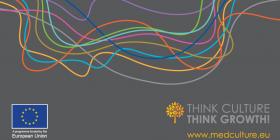
Twenty-five participants of eight nationalities– Algerian, Egyptian, Jordanian, Lebanese, Libyan, Moroccan, Palestinian and Tunisian to address some of the questions related to this theme. These participants were selected through an open call launched in October 2016 and they work as researchers, museum specialists, theatre directors, teachers, digital marketers, animators of cultural centres, and technicians.
This first Peer-to-peer workshop on the theme of Entrepreneurship was designed based on the fact that the cultural and creative sectors are a major component of economic development and we even now talk of cultural and creative industries, thereby underlining a measure of compatibility between commercial and artistic perspectives. This development has transformed the culture and creative sectors as a tool for regional development and urban planning, as can be observed in many parts of the globe. It has come about because of the fact that the production and consumption of culture have changed in a revolutionary way[1].
Entrepreneurship in the culture and creative sectors is part of this discourse, because it considers the cultural professions from a business perspective. An entrepreneurial approach to culture supports and nurtures the interactions of arts and culture with other sectors of the economy, and an exploration of this intersection involves new opportunities and roles for the sector to take up, as managing a cultural project or organisation- that is for profit or not- according to a business model is more effective. Add to that, universities of higher learning and specialised institutes have not yet grasped the value of the cultural and creative sector, which leaves the artists with little if any training in business or entrepreneurship to work on starting a creative enterprise for instance.
Drawing from this context, the workshop will tackle the following over the three days:
- The determinants of entrepreneurship within the economic and socio-cultural context and how these translate into practices – self-employment, business-ownership, profit vs. non-profit, risk-taking, etc.
- The main challenges cultural operators and artists confront in their work as cultural entrepreneurs
- Mobility as a driver of cultural entrepreneurship. International / regional mobility – of artists, cultural professionals, administrators etc.
- Marketing a cultural enterprise
[1] Nielsen, Tobias, The Creative Industries – Implications for Cultural Policy, May 2009, http://kulturekonomi.se/uploads/tnielsen-culturaleconomy-ver11.pdf






